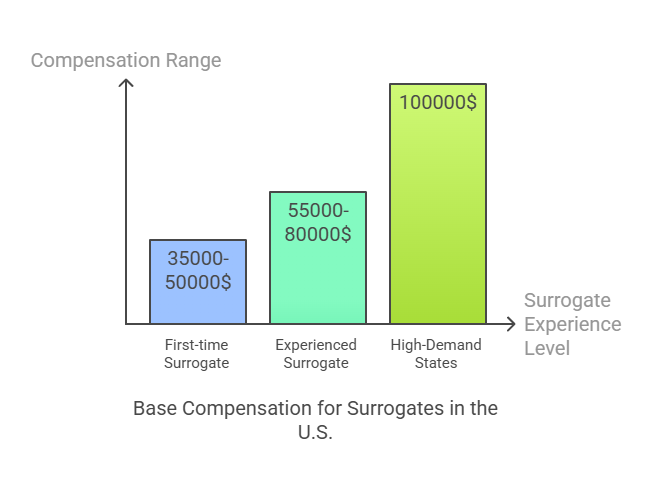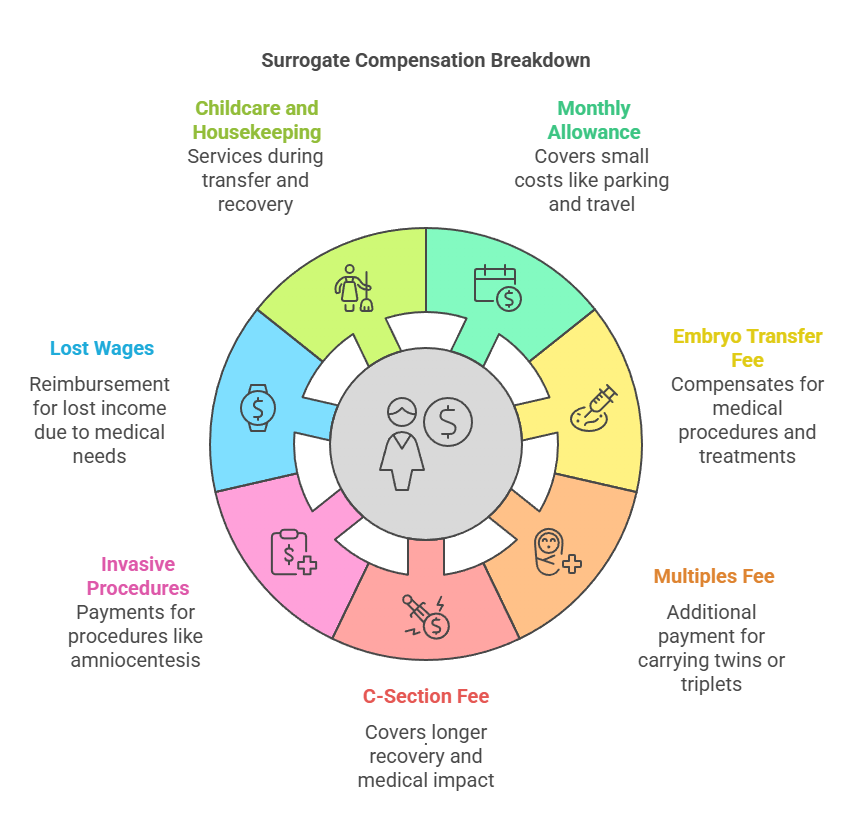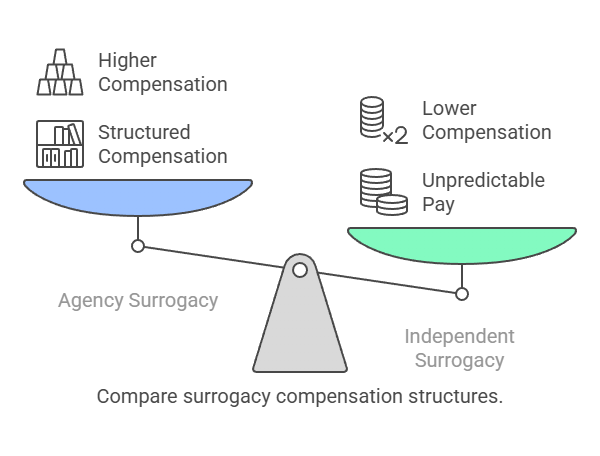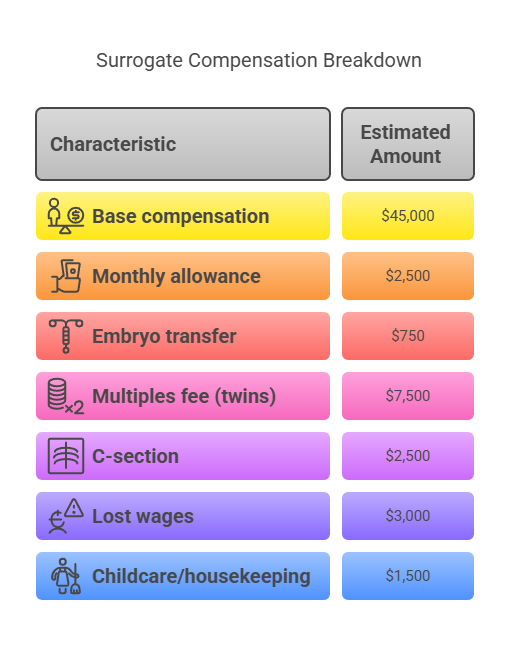Becoming a surrogate is one of the most selfless and life-changing journeys a woman can undertake. It’s a unique way to help others create a family while also receiving financial compensation for the time, physical effort, and emotional energy involved. One of the most common questions asked by women considering surrogacy is: how much does it pay to be a surrogate?
The answer varies depending on several factors, including location, experience, and the arrangement itself. In this article, we’ll break down the typical surrogate compensation, additional benefits, and key considerations that influence total pay.
More: How to Become a Surrogate Mother in Houston: Requirements & Process
Base Compensation: What Surrogates Typically Earn
In the United States, the base pay for a first-time surrogate generally falls between $35,000 and $60,000. This amount can be higher for women who have previously been surrogates and had successful, healthy pregnancies — experienced surrogates often earn between $60,000 and $90,000+.
The base compensation is intended to recognize the surrogate’s time, physical and emotional commitment, and the inherent risks of pregnancy. This amount is usually paid in monthly installments throughout the pregnancy, starting after a heartbeat is confirmed.
Here’s a general idea of the base compensation brackets:
- First-time surrogate: $35,000 – $50,000
- Experienced surrogate: $55,000 – $80,000+
- California or high-demand states: Up to $100,000 in total, including bonuses
It’s important to note that these numbers are based on U.S. surrogacy arrangements through reputable agencies. Compensation in other countries or through independent arrangements can differ significantly.

Additional Benefits and Allowances
Surrogacy compensation includes more than just base pay. Surrogates often receive various additional payments, reimbursements, and benefits depending on their specific situation and the terms of their contract. These can add thousands of dollars to the total amount earned.
More: Surrogate Eligibility Quiz
Here are common additions:
1. Monthly Allowance
Most surrogates receive a monthly allowance ranging from $200 to $300, starting after the contract is signed. This covers small costs like parking, phone calls, and travel to appointments.
2. Embryo Transfer Fee
Surrogates are typically compensated $500 – $1,000 for each embryo transfer procedure, as it involves hormone treatments, medical visits, and rest afterward.
3. Multiples Fee
Carrying twins or triplets increases the physical toll and risks of pregnancy. If a surrogate carries more than one baby, she usually receives an additional $5,000 – $10,000 per extra child.
4. C-Section Fee
If a cesarean delivery is required, surrogates often receive an additional $2,000 – $3,000 to compensate for the longer recovery and greater medical impact.
5. Invasive Procedures
Some contracts include extra payments for procedures like amniocentesis or dilation and curettage (D&C). These can range from $500 to $1,000 depending on the situation.
6. Lost Wages
If the surrogate is employed, she may be reimbursed for any wages lost due to medical appointments, bed rest, or recovery — both during and after the pregnancy.
7. Childcare and Housekeeping
If the surrogate has young children at home, contracts often include payments for childcare or housekeeping services during transfer, bed rest, or postpartum recovery.

Medical, Legal, and Insurance Coverage
In addition to direct compensation, surrogates receive full coverage of their medical and legal expenses related to the surrogacy journey. These costs are fully paid by the intended parents, typically through the agency or escrow account.
These covered items include:
- IVF treatments and embryo transfer costs
- OB/GYN visits and hospital delivery
- Medications and supplements
- Legal fees for contract review and parental rights
- Health insurance (if needed, a special policy may be provided)
- Life insurance policy (often worth $250,000 – $500,000)
All of these protections are in place to ensure the surrogate is not financially responsible for any part of the process.
More: What Disqualifies You from Being a Surrogate? Key Requirements and Exclusions

Factors That Influence Surrogate Pay
Not every surrogate earns the same amount. Several factors can significantly affect the total compensation:
1. Geographic Location
Surrogates in states like California, Colorado, and Oregon typically earn more due to high demand and favorable legal environments. Agencies often offer premium pay to surrogates in these states.
2. Experience
Women who have completed previous surrogacy journeys without complications are often highly sought after. Their experience can lead to higher base pay and priority matching.
3. Health and Lifestyle
Surrogates who meet ideal health criteria (non-smokers, healthy BMI, no major complications in previous pregnancies) are often eligible for the highest compensation.
4. Type of Arrangement
Working with a reputable agency generally results in higher and more structured compensation, while independent surrogacy may have lower or less predictable pay — though some intended parents may offer generous terms privately.

Ethical and Emotional Considerations
While compensation is an important and necessary part of surrogacy, it’s not the only factor to consider. Surrogacy is a deeply personal and emotional commitment that comes with both joy and challenges.
Most surrogates report that the emotional reward — helping another family grow — far outweighs the financial gain. However, it’s crucial to work with an experienced agency that provides emotional support, legal protections, and thorough education throughout the journey.

Total Compensation Example
To put it into perspective, here’s a rough breakdown of what a surrogate might receive:
| Component | Estimated Amount |
|---|---|
| Base compensation | $45,000 |
| Monthly allowance ($250 x 10) | $2,500 |
| Embryo transfer | $750 |
| Multiples fee (twins) | $7,500 |
| C-section | $2,500 |
| Lost wages (approximate) | $3,000 |
| Childcare/housekeeping | $1,500 |
| Total Estimated Compensation | $62,750 |
This is just one example — actual totals can vary significantly depending on circumstances.
More: Compensation for Surrogate Mothers: What You Should Know

Final Thoughts: Is Surrogacy Worth It Financially?
Surrogacy is not just a job — it’s a calling. The financial compensation can be life-changing, allowing surrogates to pay off debts, save for their children’s education, or put a down payment on a home. But more than that, surrogates often describe the experience as one of the most meaningful things they’ve ever done.
If you’re considering becoming a surrogate, take time to research reputable agencies, ask questions, and make sure you fully understand the legal and emotional journey ahead. When done ethically and with the right support, surrogacy is a rewarding path — both emotionally and financially.




